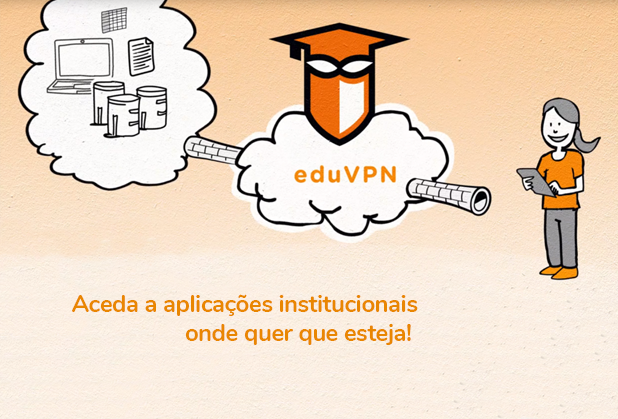Find out how the program eduVPN, promoted in Portugal by the FCCN Unit, facilitates remote work for students, teachers and higher education staff in Portugal.
When, in March 2020, the Covid-19 pandemic led to the adoption of distance learning and teleworking, some institutions in the RCTS, the Portuguese academic network, signaled the need to securely remotely access internal platforms or networks. In this context, FCCN Unit focused on disseminating a quick response without additional charges: the eduVPN.
Originally created by the Dutch academic network – SURFnet – the eduVPN It was later developed by GÉANT, the association of European academic networks. For this reason, the program now has a European dimension. As such, this project, promoted in Portugal by the FCCN Unit, is aimed at the international research and education community. seeking to respond to local needs to be online safely.
As a program of VPN (Virtual Private Network), the eduVPN was developed specifically to meet the needs of the academic community, creating a “tunnel” that protects data traffic, even when browsing an unsecured network. This way, It is possible to access resources from the home institution, from anywhere, economically and without advertising interruptions.
eduVPN provides two types of implementation. secure and private access to public networks (providing gateways secure access to trusted networks, in the case of using, for example, public Wi-Fi access points) and also the access to private networks (a solution in which the user can access resources on their institution's internal network).
As part of the FCCN Unit's response to the needs of the RCTS community, a installation guide in Portuguese and a quick script presents the main advantages of this program, which is available as software and can be implemented by any national research and education network or interested institution.
For more information, visit: https://www.eduvpn.org/
“eduVPN meets our needs”
"During the first wave of the Covid-19 pandemic, given the increased need for teleworking, the remote access service (VPN) was one of the areas in which we felt the need to reinforce capacity," explains Marco Teixeira, from the Information and Communications Systems Services Unit at the University of Minho, before adding: “After some research, we chose eduVPN because it has the features that meet our needs.”
The absence of financial and licensing costs, ease of use, application integration for major platforms, and an architecture capable of horizontal scalability were some of the main advantages found in this solution, reveals Marco Teixeira. Development and implementation were completed in record time. account, thanks to the proactivity and availability of the eduVPN team, which really managed to “incorporate some additional features that allowed an implementation suited to the prerequisites and use cases”.
As a result, eduVPN can now be used by the entire academic community of the University of Minho (professors, staff, researchers or students), ensuring “secure access to internal resources”, as well as external resources that are only accessible through the use of a University IP address, “also allowing users to increase their security when they are abroad or using public Wi-Fi hotspots”, concludes Marco Teixeira.












